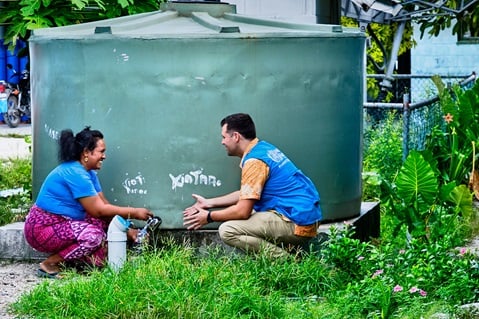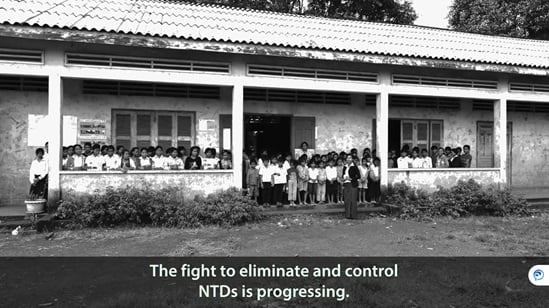Intestinal Worms (soil-transmitted helminthiases)
Intestinal worms or soil-transmitted helminthiases are caused by infection with the nematodes Ascaris lumbricoides (roundworm), Trichuris trichiura (whipworm), and Ancylostoma duodenale or Necator americanus (hookworms) and are among the commonest infections in humans. Those living in poverty are most vulnerable to infection.
Intestinal worms are among the most common infections worldwide and affect the poorest and most deprived communities. They are transmitted by eggs present in human faeces which contaminate soil in areas where sanitation is poor. Intestinal worms are a major public health problem because the worms disrupt people’s ability to absorb nutrients, impeding the growth and physical development of millions of children.
Deworming programmes with a single-tablet treatment can drastically reduce the suffering of those infected with parasitic intestinal worms and improve the health and nutrient uptake of heavily infected children. Improving basic hygiene, sanitation, health education, and providing access to safe drinking water are also keys to resolving the health and nutritional problems caused by intestinal worms.
13 countries in the Western Pacific Region require interventions and only 6 countries are implementing and reporting interventions. These countries include Cook Islands, Cambodia, Kiribati, Lao People's Democratic Republic, Philippines, Tuvalu and Viet Nam (where education ministries take a lead and ministry of health supplies medicines donated via WHO). Other countries, such as Fiji, Solomon Islands and Vanuatu are also gradually scaling up, though involvement/leadership of education ministry is still limited. Cambodia and Viet Nam are covering women of child-bearing age also. Regular deworming of preschoolers is mainly supported by UNICEF using mebendazole.
Morbidity is related to the number of worms harboured. People with infections of light intensity (few worms) usually do not suffer from the infection. Heavier infections can cause a range of symptoms including intestinal manifestations (diarrhoea and abdominal pain), malnutrition, general malaise and weakness, and impaired growth and physical development.
Infections of very high intensity can cause intestinal obstruction that should be treated surgically.
S. stercoralis may cause dermatological and gastro-intestinal morbidity and is also known to be associated with chronic malnutrition in children. In case of reduced host immunity, the parasite can cause the hyperinfection/dissemination syndrome that is invariably fatal if not promptly and properly cured and is often fatal despite the treatment.
In 2001, delegates at the World Health Assembly unanimously endorsed a resolution (WHA54.19) urging endemic countries to start seriously tackling worms, specifically schistosomiasis and soil-transmitted helminths.
The strategy for control of soil-transmitted helminth infections is to control morbidity through the periodic treatment of at-risk people living in endemic areas. People at risk are:
- preschool children
- school-age children
- women of reproductive age (including pregnant women in the second and third trimesters and breastfeeding women)
- adults in certain high-risk occupations such as tea-pickers or miners.
The WHO recommended medicines –albendazole (400 mg) and mebendazole (500 mg) – are effective, inexpensive, and easy to administer by non-medical personnel (e.g. teachers). They have been through extensive safety testing and have been used by millions of people with few and minor side-effects.
Both albendazole and mebendazole are donated to national ministries of health through WHO in all endemic countries for the treatment of all children of school age.
Ivermectin for the control of S. stercoralis is expected to be available at an affordable price.










